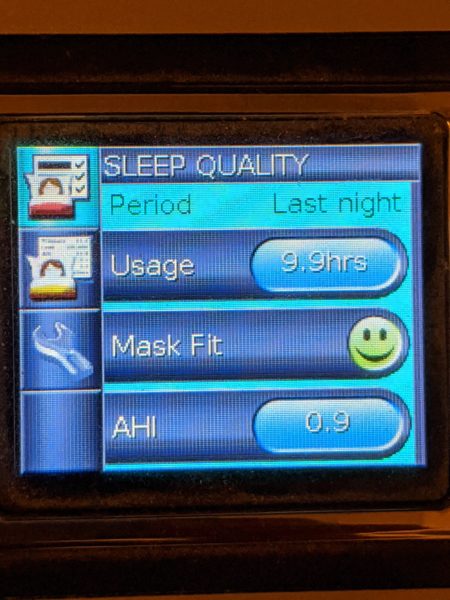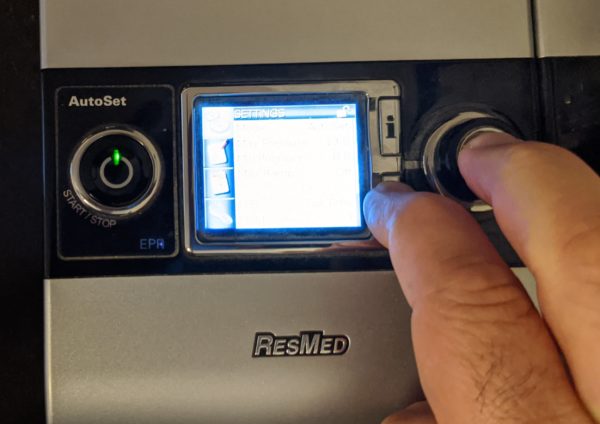Snoring, Obstructive Sleep Apnea, and Glorious Sleep
I’ve been using a CPAP since 2015 to stop my snoring and sleep apnea. It’s great! Lemme tell you some things about my experience. I can’t believe I haven’t written more about this!
With a CPAP, I need 1 hr less sleep per night AND I wake up more rested AND my throat doesn’t hurt every day AND my wife tolerates the sound way better than hearing me snore, snoore, snooore, snoooooooore, SILENCE SILENCE SILENCE [oh god is Lee going to die????] SILENCE SILENCE gaaaaaasp! [phew!] snoore [damnit]
If you’re thinking that maybe you want to look into this stuff, here’s what I suggest. Figure out for yourself what your sleep experience is and whether it could be better. What matters is YOUR impression, not mine, and not some doctor’s! That said, it’s hard for you to know what things “should” be like because you are the only one with your sleep condition. I strongly support that you measure what is going on in your sleep-life. Start with the easiest measurements!
- Keep a sleep log for a few weeks (just write down your daily impressions of sleep every night)
- Ask your sleep partner what their impression of your sleep is. Ask them a few times over a few weeks.
- Get a free app like Snoreclock to listen to you sleeping. If you hear your snoring and/or sleep apnea for yourself, you’ll have a better idea as to what’s going on!
- I tried pointing a webcam at me while sleeping a few times but it kinda weirded me out watching myself sleep!
Keeping a sleep-log for few weeks was useful for me. I noticed that I was more groggy in the morning when I had been snoring (and apnea-ing), even when I’d sleep for 9-10 hours. Actually, sleeping longer was WORSE for me, which makes sense because of having less oxygen going to my brain for longer. Getting input from my wife was somewhat helpful, “Did I snore last night?” “I don’t know but you kept me up all night.” “What?”
You might be tempted to wait to investigate this sleep thing. Maybe you’re thinking you’ll wait until you’ve lost weight. Yes, weight loss usually helps sleep and sleep apnea. But why wait for to lose weight when you can approach the solution from multiple directions? Similarly, meditation helps get rid of headaches, but ibuprofen is in your medicine cabinet! Use it!
I have seen 4 sleep doctors and my impression is to not trust them but instead trust your own experience and research. Every sleep specialist told me “Oh yeah, you need a CPAP” but they couldn’t help me get it working well without me putting in all the work myself to get it working. “You’ve ben using it 4 hours per night, that’s great.” “It doesn’t feel great.” “Well, some people don’t tolerate it any longer.” “Really? You’ve got nothing?” My friend went to a surgeon for his sleep troubles and the surgeon recommended (I’ll let you guess…..) surgery! He never even recommended a sleep study. He wrote me last week “Yeah, that was the weird thing, the doctor who took out the uvula / tonsils / turbinets didn’t even bother getting a sleep study, and I never had one as a followup. So I’m sure it made things better the issue would be if it made them better enough. I’m only now considering that it might not have been sufficient.” Caveat emptor!
My experience is that when I don’t use the CPAP, my throat and tongue relax, blocking my airway. So I snore loudly and have apnea. Apnea means that maybe 20 times an hour while sleeping, I stop breathing for about 30 seconds until my brain says “Hey, wake up and breathe or you’ll die!” This whole unfortunate process means that oxygen saturation goes down, I wake up a little hundreds of times a night, and I just don’t sleep well! But when I’m wearing my CPAP, the air pushes all the wiggly bits out of the way, I don’t snore, don’t apnea and wake up refreshed!
At first I had a lot of issues with using it. I struggled for almost a year every night trying to get it to fit well and increase my compliance (ie. how long I would wear it before ripping it off in frustration every night). At first, I wore it 2-3 hours per night, which simply isn’t enough. Now I almost always wake up in the morening wearing it, which is awesome!
Here’s all that I did to wear my mask all night:
Fit – I tried a lot of things to get a better fit. What did it for me was getting a Large full-face mask. I’m using a Resmed Airfit F20. I had been to 4 clinics and… I’ll tell you what, none of them wanted to take the frigging mask out of the package to let me try it on because if it didn’t fit, they’d have to expense it. I finally got a sleep tech at Kaiser Richmond to let me try on some masks. I was the one to ask, strongly, for a Large mask and he opened the package. I wore it for 30 seconds in the clinic and I could immediately tell it felt better than the Mediums that was “supposed” to be the right fit for me.
The right mask got me 80% of the way there. I also shave before bed, it’s no bother with an electric razor. And I wash the mask in hot soapy water every week; if I don’t, I have to keep tightening it to keep it from leaking which eventually doesn’t work well. I also sometimes clean the mask with isopropyl alcohol. With soap and alcohol my masks last a long time! I had tried a mess of other techniques with moderate success.
Maybe you can use a nose-only mask but when I tried one in the sleep clinic, as I fell asleep, the air would go in my nose and right out my mouth which is wei-eerd!
Other issues I’ve tackled….
Appearance – At the very beginning, I was very concerned about it looking dorky or blocking my view or… blah blah blah. Screw that. No one sees you in bed except people that will ALWAYS want you to wear it since it stops you from snoring. I tried a couple sleep appliances and they all sucked. CPAP is the first line treatment for Obstructive Sleep Apnea (definitely get a free Medscape account and check out that link!). I had tried a tongue suction thing, a chin strap, and a mouthguard and they were silly. The second-line treatment for apnea is ALSO CPAP: a fancy CPAP machine called a BiPAP. Surgery is the distant-third option.
Every sleep specialist I visited knew about the same about sleep and CPAP usage that I did. There’s really not that much to know. If you think your CPAP problems can be resolved by going to yet another specialist, you may be overvaluing their lab-coats. I am still pissed at how much each specialist charged my medical insurance for what I got. My sleep evaluation was ten THOUSAND dollars and the result was them saying, “Yup, you stop breathing because of your snoring. A CPAP will probably help. Here, maybe this one will fit. Good luck. Good bye.” The mask fitting session was terrible, their bedside manner was terrible, their billing was terrible, administrative help terrible.
Here’s the review I wrote for Sleep Diagnostics of Fremont.
I thank them for my sleep apnea diagnosis but my experience could have gone much better. A thousand cuts: they could have warned me about the goop they were going to put in my hair for the polysomnography and not lied about that being in the written materials they gave me. The admin people on the phone were weird and unhelpful in many ways. They didn’t help AT ALL with me getting a mask, which resulted in me spending another YEAR trying to find one that fit better. They asked me to sign paperwork that they hadn’t read themselves “Oh, its standard stuff” they said but it wasn’t. And all this terrible service for charging my insurance $10k. Hurumph.
I adjust the settings on the CPAP myself. My max pressure is set to 13.8, min pressure is 8.8. Last week, for the first time in maybe two years, I adjusted the pressure: I changed the max pressure from 13.6 to 13.8 because Megan was saying I was having multiple apneas in a night. My chest felt a little stretched for a night by the additional pressure but it solved the problem immediately. If you change the settings yourself, do it slowly! If you push the pressure too high, you may get central sleep apnea which means that you never exhale, which could be, you know, bad. If you set it too low, you’ll feel like you’re not getting enough air and you’ll rip the mask off at night. Initially, I changed the settings a moderate amount over a few weeks and it helped. At the very beginning, I kept going back for doctor’s appointments for them to change the settings and it was a big hassle. In a few nights of fiddling, I had it dialed in much better than their settings.
I tried using software to look at my CPAP usage patterns. I used Sleepyhead and ResScan from Resmed, None really helped dial in the reason for me not wearing except to help me focus on the problem. Using the free Snoreclock Android app was helpful. I never paid for it and it worked great. The use-case: It would record audio the whole evening and the next morning it would display red areas on a chart when I was snoring. I’d zoom in and look at the volume chart to see if I may have stopped breathing at any time. Then I’d listen to the zoomed-in audio. One hint: It displays different screens when you rotate your phone.
Here’s another tidbit: the manual says I’m supposed to buy a new mask, mask holder, air hose, and humidifier tray every 3 months or so. At first I was buying the stuff like I was supposed to. I’d buy it through my insurance with a co-pay. But then I figured two things: first, most of the items are much less expensive on Amazon than through insurance ($25 mask instead of $50 COPAY for the same item?!) Second, the only regular maintenance I’ve needed is to replace the air filter every 6 months, wash the mask weekly, and replace the mask and mask holder yearly or so. If I was using a humidifier, I could understand a need to keep things cleaner.
Definitely check out my post from 2017 about CPAP.



